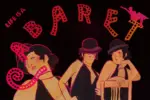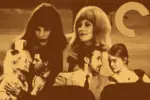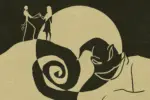Even a year after its release, “Tick Tick Boom” continues to resonate with musical theatre fans as a revelation. The directorial debut of famed musical icon Lin Manuel Miranda, the movie is an absolute blast through and through. What makes it particularly great, however, isn’t Andrew Garfield’s fantastic lead performance, the energetic and lively editing, or its deglamorization of the starving artist trope — though all of these reasons are valid and exceptional. It turns out that what really makes “Tick Tick Boom” great is that it’s one of the few modern movie musicals that’s actually watchable.
It doesn’t sound like much, but that’s how low the bar has been for years. The past two decades have seen an onslaught of original or adapted musicals in the form of movies that have been middling, at best. “Les Misérables,” “La La Land,” “Rent,” “Into the Woods,” “The Phantom of the Opera,” “Cats,” “Sweeney Todd: The Demon Barber of Fleet Street,” “The Producers,” “Dear Evan Hansen” — Is the reader running out of breath yet? This is a simplified list, featuring films that have received much acclaim and accolades … somehow!
Let’s not beat around the bush — these films simply aren’t good. Though much of the animated Disney catalog is stellar at the moment, the live-action remakes are … ugh. It’s kind of funny that this trend is so consistent, despite the fact that Broadway musical theatre is thriving. All in all, Hollywood lags behind, and it’s not hard to see why.
Why Movie Musicals Suck
Theatre Is Weird
Musicals, by their nature, require some suspension of disbelief, as the audience is constantly aware that they’re watching a performance. Films, on the other hand, often allow viewers to completely immerse themselves in what they are watching. Simply due to their different natures, some things in a film will not translate into a musical, and vice versa.
Realism Is Trendy
What tends to get the Academy Awards’ attention these days is realism, a word that does not fit well with the musical’s reputation of camp. Take the 2013 edition “Les Misérables” for example, which visually looks like “The Pianist” but tonally resembles “La Resistance” from “South Park: Bigger, Longer & Uncut.” A movie doesn’t need to receive the attention of the Academy to be considered good.
Music Is Hard
Much like how animated family films will feature a cast of stars for the sake of making money, movie musicals often cast stars who can barely hold a note. Whether the actors are blessed with pitch correction (auto-tune) or are doing everything live on set (which is incredibly stupid), these people are left bare and exposed. If a movie musical is going to sell its value based on its actors, then they had better be able to sing — and sing well.
Live Is Real
No seriously, doing live recordings of musical numbers is incredibly stupid. A lot of effort must go into getting a studio-quality sound recording out of a live take because sets can get very noisy, and each actor must have a separate microphone. Also, during a live recording, the orchestra has to follow the performers, which is never the case in a real musical environment; the performers follow the orchestra, not the other way around.
Musicals Are Stupid
Nothing good can arise from an individual or collective who is uninterested in their project. Take Tim Burton, for example, who directed “Sweeney Todd” despite openly stating that he hates musicals. It’s understandable if you need the money, but why willingly take up a job that clearly doesn’t interest you?
Rewrite Is Best
There are some movie musicals that cut entire songs, scenes, plot points or even a character or two. These edits are often made to accommodate the medium transfer or to improve the story. But they can also have the alternative effects of messing with the story’s continuity, the character growth or the overarching message. If edits are going to be made, they should make the story better — not worse — than it was when it came to the editor’s desk.
Copying Is Flattery
When musical adaptations for film don’t actually change anything, they tend to resemble the actual show verbatim, like in “The Producers.” Broadway producers make changes to films they’re adapting into musicals all the time, and it works because they account for the change in medium and work with the story strategically.
Why ‘Tick Tick Boom’ Works
It should be noted that “Tick Tick Boom” is great because it acknowledges all of these problems and learns from them. The numbers are a perfect blend of fantasy and realism, including everything from real performances to montages and fantasies. Garfield not only sings and plays piano, but is great at both; Director Miranda is the textbook definition of a theater kid; and the changes made by the directors improve both the music and the narrative through the medium of film. Ultimately, “Tick Tick Boom” works because its creators clearly know the story and the medium.
Hopefully, Hollywood will take Miranda’s directing debut not as an exception, but as the new standard. Musicals are a wonderful method of storytelling, and it’s painful to see people turn away from them simply because the creators don’t seem to care. Scratch that, they do care, but only insofar as their creations are commercially profitable or Oscar bait. If someone is really interested in making a really good movie musical, then ignore the examples of Tom Hooper and James Corden. Miranda has raised the standard.

















